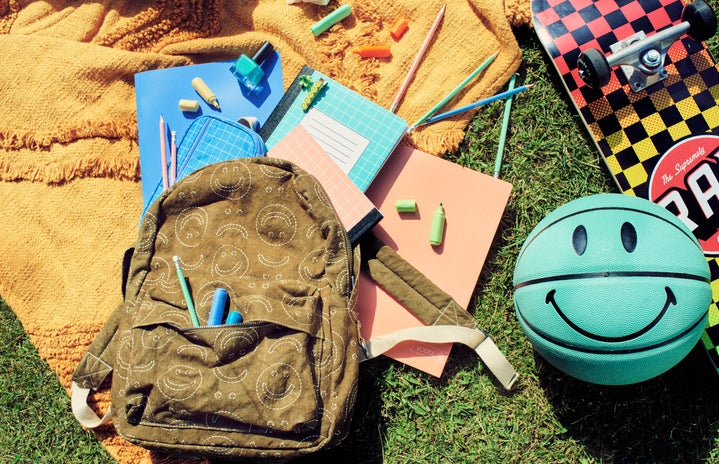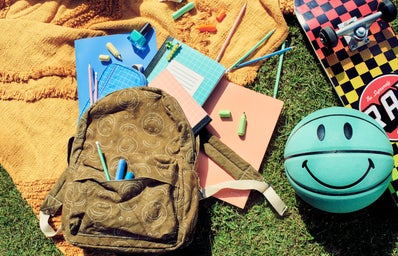When I was in the sixth grade I used to watch over a third-grade classroom’s lunchtimes with a friend who outgrew me the following year. The two of us were 11 and Disney-obsessed. We would discuss what colour elastics would look best with braces and plan coordinating outfits from Bethany Mota’s Aéropostale line. It was cringeworthy, but it was also liberating.
During those 20 minute lunch periods, we used to joke around about how immature we looked next to the 8-year-old girls in the class. With their sequined crop tops and sharp eyeliner, I felt horrifyingly uncool. At their age, I was showing my sister how to layer chalk dust on our faces to mimic blush and work around our parents’ disdain for makeup on children. I remember envying my friends’ green eyeshadow for dance recitals and trying to catch glimpses of child pageantry on television. Now, I can understand why my parents tried to shield me from that world, but at the time, it felt like I was the last one to grow up. I remember the pressure I felt to be older, a woman at 8 years old when the word felt like an embarrassing brooch that called too much attention to me.
In my friend group, it was fun to lament over our awkward phases, the dorky outfits and the melodramatic poetry that has become synonymous with puberty. It was fun to complain about how young girls today never had to endure those embarrassing memories and seem to just ease into the biggest trends. Our social stagnation felt like a badge we had earned, a rite of passage that developed character.
I fully believe that the preteen girl is being erased in North America because of how they are being socialised. Stores are selling tighter and more revealing outfits in children’s sizes. There has been a rise in TikTok trends and mature fashion looks that are pushed on young girls. These days I see 12 and 13-year-old girls posing on TikTok in bodycon dresses that feel nothing like the frilly, tulle-infested outfits from my eighth-grade graduation.
Maybe I’m out of the loop or less woke than I thought, but it feels weird to see children sexualizing themselves for online clout. I remember being ushered out of the room during Disney Channel original movies and Nickelodeon sitcoms because they were too mature. Now I listen to 7-year-old girls talk about their favourite characters in The Vampire Diaries and Euphoria. There is very little content being created for an audience of 11 to 14-year-old girls. Instead of young artists and boy bands singing about teenage experiences like first loves or popularity contests, artists are singing about more mature concepts.
I hope I don’t sound conservative when I say that these shifts are alarming. It’s difficult to critique their behaviour without feeling like I am attacking their choices or their parents. Regardless of how families are raising their children, access to the Internet at increasingly young ages is exposing preteens to media, trends and behaviours associated with teenagers and young adults. The gap between the childhood and adolescent years of girls has essentially disappeared. Girls seem to be pushed into adulthood at a younger age, and social indicators of that awkward developmental stage are disappearing along with them.
There’s a certain type of obsession that only exists in preteen girls. I remember categorizations between fandom Tumblr and hipster Tumblr; the first online subcultures that could define a person’s identity. Since I didn’t go to a high school with strict cliques, these hyper-focused communities only existed in the online sphere. Did you hold up cheesy quotes with a snapback on, or did you draw on Dan and Phil’s cat whiskers? Were you SuperWhoLock cinnamon roll trash, or are you fortunate enough to not know what I’m talking about?
Now, in university, I see the same online pigeonholing that I remember falling for in middle school. My preteen years were a time to explore my individuality, and I fear that defining one’s identity through communal stereotypes will rob young adults of a necessary coming-of-age rite. Maybe that white tank top doesn’t have to be “Lana-del-Rey-coquette-ballet-core,” maybe it’s just a shirt. There is a need to invent yourself into a marketable package, an aesthetic product that defines your identity through a subculture.
Complaining about it makes me feel middle-aged, but I’m worried. Forgetting these demographics feels like a minor oversight but will eventually damage the psychological development of a generation. Preteen girls are not to blame for these phenomena. Impressionable minds will admire the models presented before them, and there is a desperate need for more age-appropriate standards. The danger doesn’t lie in letting women wear what they want, it is in disguising the sexualization of minors as a form of empowerment. Social conditions must change, from the male gaze to the erasure of female audiences. Continuing to allow these patterns to exist opens the door to diet culture, grooming and adolescent depression.
Girlhood was a privilege, and I wish more people would be willing to indulge in it.


